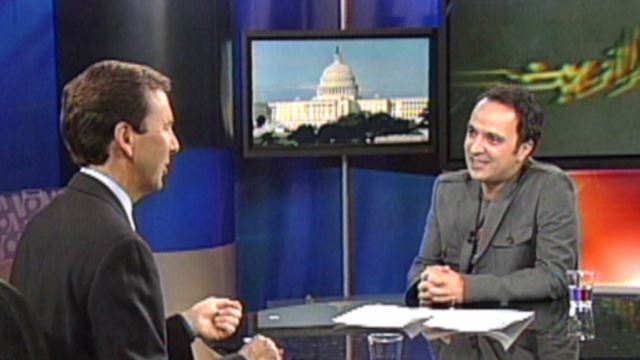Rumi-speak is rare example of a fluent America

Alan Eyre on Voice of America’s Farsi language television show Parazit when the State Department announced that Iranian student visa rules would be eased
There are the Lausanne talks over Iran’s nuclear programme and then there is America’s real attempt at the language of diplomacy. In Persian. This is mostly through Alan Eyre, a State Department official capable of deconstructing US policy and preoccupations for dissemination in Iran, using snatches from the 13th century Persian poet Rumi or poignant lines from the Persian prose classic Gulistan of 1258.
Time is of the essence, he indicated to the Iranian media as the negotiations went down to the wire, throwing in a line from The Rubaiyat of Omar Khayyam: “Be happy in the present, and don’t put your life in the wind.” Even when he said “no comment”, it was with an expressive quote from Shiraz’s most famous poet, Saadi: “A knowing man will not utter every word which occurs to him. It is not proper to endanger one’s head for the king’s secret.”
Any deal and Iran would hear of it first from Mr Eyre, with pertinent flashes of American perspective and Persian couplets.
In essence, Mr Eyre’s role might be described as that of an interpreter of cultures, a burdensome and fraught task that he would, no doubt colourfully depict in the Persian idiom as “watermelons under my armpits”.
It is a crucial job. The folksy idiom and florid imagery interpret American concerns for Iranians louder but more subtly than all the press conferences and official communiques. As Nelson Mandela once said, when he described the difference between talking to a man “in a language he understands and in his own language”: the first goes to his head; the second to his heart.
Rumi-speak from the State Department goes to many Iranian hearts. But that it makes the news in 2015 and Mr Eyre is considered something of a rarity is an indicator of the great linguistic deficit within America’s diplomatic ranks. It operates the largest foreign service of any country but when American diplomacy is seen on television or on the road, the world finds too few of its officials able to express themselves colloquially in the language of the country to which they are assigned. If they did – or more accurately, could – American foreign policy might be smarter, more strategic, more instinctively sensitive to nuance.
It took 9/11 for America to realise it had too few diplomats fluent in Arabic. The deficit meant that the US could not really understand the Arab “street”and all its internal rhythms. Equally crucially, it could not adequately convey its often-controversial point of view to the region in scattered bursts that might include, say, a cafe conversation with excited college students about religion and the state.
Such fluency is generally the preserve of native or so-called “heritage” speakers of a language, but it can be taught to diplomats too, if there is enough time and money invested in the effort and if there is a genuine commitment to understanding what makes a people tick, how they think and why they do. This contributes to better strategic planning and improved relations in the longer term.
We have it on good authority that speaking the same language, complete with local idioms, can do a great deal, even avert wars. Oliver Miles, a former British ambassador to Greece, tells a pertinent story from Athens, 1996. He had to persuade Athens to draw back from a confrontation with Turkey over some small islands in the Aegean Sea. They were so insignificant they might be “rocks” , he recalled, but “it was getting very close to shooting” when he received the instructions he needed crucially to deliver to the Greek foreign minister. The minister did not speak English, it was the middle of the night and he was attending “a kind of war cabinet and certainly did not wish to speak to foreign ambassadors”. The winning point proved to be Mr Miles’s language skills. “My Greek was good enough to fight my way past telephone operators and secretaries to give him my message. My American and German colleagues had parallel instructions. Neither spoke Greek. There wasn’t a war,” he writes.
But it’s not always about imminent hot wars. Sometimes hostility or a glowering peace can doom relationships and threaten regional or world stability.
The confrontation with Russia over Ukraine is the most recent example of the West’s seeming incomprehension of the culture of Putin (and Pushkin). There appears to be little nuanced understanding of how to talk to a country that is smarting from the loss of empire and feeling so threatened by Nato’s eastward expansion that it stoutly supports its strongman regardless of a falling rouble and international isolation.
Last month, a report by the British parliament’s Foreign Affairs Committee admitted as much. It found that the UK’s diplomats did not know enough about events in Ukraine because there were too few Russian-speakers to anticipate, interpret and strategise about the most serious East-West tensions since the end of the Cold War. The Americans have owned up to no such deficit but their harrying tone to Moscow, alternating with the occasional faltering plea, sounds like strategic incoherence because they’re lost for words. Russian ones.

